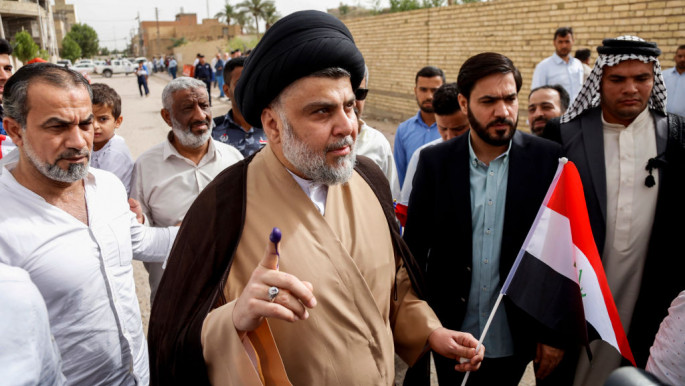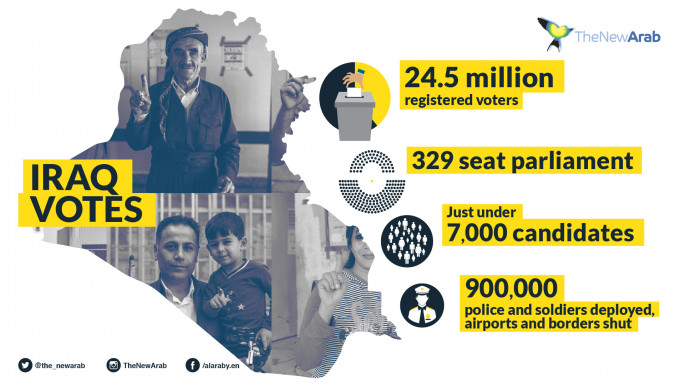
Sadr's Iraq: A vote against sectarianism and corruption
Formed primarily by Shia cleric Muqtada al-Sadr and his movement, Sairoun, which means 'On the Move', also contains the Iraqi Communist Party, as well as a host of smaller mostly secular, anti-sectarian reformist parties.
Given what Iraq has endured these past few years, with the veritable terror army of Islamic State (IS) seizing control of much of the country, leading to a brutal war to wrestle back territory, it's a bold statement.
The incumbent prime minister Haidar al-Abadi, a favourite of both Iran and the US, perhaps assumed he could safely run on what might be called a 'triumph ticket' – wherein his self-styled status as saviour of Iraq would avoid scrutiny on the wider issues.
In addition to the fact that he's not the only act in town exploiting this angle, with the sectarian People's Mobilisation Units (PMUs), led by Iranian proxies like the Badr Organisation, forming their own political force called the Fatah Alliance, it seems that this strategy has failed.
Though the results are not finalised, Sairoun appear to have received the largest share of votes and seats from Iraq's 18 provinces, followed by Fatah, with Abadi's 'Victory Alliance' falling into a dismal third place.
 |
This result has rattled the status quo of post-occupation Iraq |  |
Though Sadr isn't seeking to become prime minister, this result has rattled the status quo of post-occupation Iraq.
The result was supposed to be a landslide for Abadi - not for Sadr who, going by his rhetoric and his choice of allies, seeks to overturn that status quo.
Muqtada al-Sadr may not be the king of Iraq, but is now best positioned to be the kingmaker. This means that concessions to his political agenda must be given.
Sadr offers by far the most radically progressive voice in mainstream Iraqi politics. Even if Abadi remains prime minister, which is a possibility, he will need to come to terms with a force that has rallied a lively and loyal base of supporters determined to overturn everything Abadi and his ilk represent.
Which brings us back to 'corruption is terrorism'.
Read more: Iraq: As parties fracture, signs of change emerge
This slogan preempts the endeavour of Iraq's ruling elites to exploit the brutal war against IS to avoid electoral scrutiny, while demonstrating that it's precisely the past behaviour of those same ruling forces that almost led to Iraq's destruction.
To put the message as starkly as possible: Iraq's corrupt, sectarian post-war political class is every bit as dangerous as IS.
Sadr's platform has been dazzlingly simple: Replace a ruling elite that relies on sectarian division and which corruptly gorges itself on Iraq's resources, with a non-sectarian, technocratic government that will bridge divides and root out corruption.
They want the kind of transitional government that Iraq was never allowed to have – the post-occupation Iraqi government went from Saddam's fascist tyranny to a formally democratic system that relied on sectarian division and the isolation of minorities.
 |
|
| Moqtada al-Sadr casts his vote at a polling station in the central holy city of Najaf, 12 May, 2018 [AFP] |
An order that turned Iraq into a breeding ground for endemic corruption intersected with sectarian disillusion and the conditions that made the rise of IS almost inevitable.
Though the common line is that the US and Iran have been mortal enemies in Iraq, the reality is quite different. While real differences between the two exist, the US, first under Bush and even more so under Obama, came to accept that a stable Iraq that met their geopolitical interests meant one where they would have to accept some level of Iranian hegemony.
The prevailing order in Iraq can best be described as 'functional disunity', a riff on the old imperialist strategy of divide and conquer.
During the 2010 parliamentary elections, when the non-sectarian Al-Iraqiya gained more votes than Nouri al-Maliki's Islamic Dawa Party, two external players came out in support of Maliki clinging on to power: The Iranian regime and the Obama White House.
 |
They want the kind of transitional government that Iraq was never allowed to have |  |
It's of no surprise that Sairoun have been hugely critical of Iran's use of Iraq and Iraqis to intervene on behalf of Assad. Though Iran quickly co-opted Iraq's PMUs, it was like an arsonist rushing to put out a fire they had started, given the extent to which IS' rise in Iraq could only happen on such a terrifying scale due to the Iranian-supported sectarian genocide next door in Syria.
Iraq, in the eyes of Sadr and the strand of Iraqi nationalism he represents, is better off out of the killing fields of Syria, where Iran happily sends young Iraqis to die, whipping up religious and sectarian zeal for their own imperialist agenda. Sadr has broken completely with Iran on this question, including calling for Assad to step down following the Khan Shaykhun massacre.
 |
|
There are of course the usual notes of caution. Though Sadr has now cast himself as redeemer and reformer of the malfeasant, sectarian Iraqi state, he and the Sadrists, including their armed win the Mahdi Army, have far from clean hands. They too, have at times enjoyed the spoils of state corruption, as well as - despite their rhetorical attempts to form a cross-sect resistance to the US occupation forces - indulging in grizzly sectarian attacks.
But things were never as simple as they presented. Despite regularly hearing comments to the contrary, Sadr's Mahdi Army, though funded at one point by Iran out of necessity, often fought Iranian proxy forces, most notoriously Badr.
In fact, such was the extent of Sadr's Iraqi nationalist form of Shia Islamism, that one unit of the Mahdi Army split from Sadr, forming the notorious sectarian serial killers Asayib Ahal al-Haq, nominally led by Qais al-Khazali but controlled by Iran's Qods Force. It's of no surprise that both leading Badr members and Khazali are organising as part of Fatah against Sadr.
One of Sairoun's leading policies is to ensure that the PMUs are integrated into a national Iraqi Army, precisely to prevent repeated sectarianisation and co-option by Iran.
 |
Sadr's point is that Iraq can only be secure through unity in practice |  |
It is undeniable that over the past years Sadr's ideology has undergone an interesting ideological evolution. In 2012, when peaceful protests erupted mainly among Iraq's oppressed Sunni minority, calling for an end to sectarian policies and more autonomy for their communities, Sadr sided with them.
He claimed that then prime minister Maliki bore "full responsibility" for the protests' and declared that Iraq needed a new non-sectarian government that represented all Iraqis. He warned Maliki that the protests must be supported by the government and claimed he would even travel to al-Anbar and take part in the protests.
Of course, Maliki didn't heed a word of Sadr's warning and responded to the protests with vicious sectarianism, leading to the massacre at Hawija, which, in combination with its successes among the sectarian killing fields in Syria, led directly to the return of IS.
But, again, it casts Sadr in good light as a potential reformist – not only did he correctly warn the Iraqi ruling class that their sectarian and malfeasant decadence threatened to fracture the country, but he is now outlining the reality that 'security' is a much bigger question that simply having lots of guns and allowing powerful external forces to run the show.
Sadr's point is that Iraq can only be secure through unity in practice.
Twitter Post
|
And, with all the usual caveats assigned to trusting someone like Sadr, he has put his money where his mouth is - he has reached out to allies that were previously considered to be enemies, such as the secular, anti-sectarian reformists that comprise Sairoun, namely the Iraqi Communist Party and the Sunni-led Iraqi Republican Party.
Sadr has, in the past two years, partly as a way of coming to terms with his new secular allies but also to embrace the kind of social change necessary to radically alter Iraq, even taken the unprecedented step of ordering the end of attacks by his followers and other militias on LGBT people.
It could be that the same old processes iron out the radical content of Sadr's platform, but the fact that Sairoun have won this election is proof that a significant popular base exists within Iraq that is ready to accept radical change, perhaps regardless of who offers it.
In the wake of the Arab spring, the region is dominated and gripped by sectarian order. The brutal defence and reestablishment of this order comes at the expense of the self-determination of the peoples of the region.
Sadr, as someone who wants to disrupt this - whether it's being upheld by Iran, Saudi, the US or Haidar al-Abadi – using democracy and not bombs and through unity and not division, is currently the most dangerous man in the region in the eyes of those who want to uphold it.
Sam Hamad is an independent Scottish-Egyptian activist and writer
Opinions expressed in this article remain those of the author and do not necessarily represent those of The New Arab, its editorial board or staff.





 Follow the Middle East's top stories in English at The New Arab on Google News
Follow the Middle East's top stories in English at The New Arab on Google News


